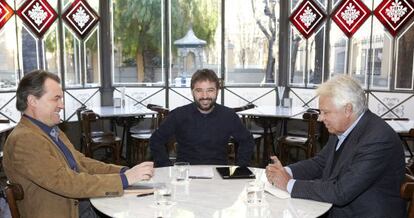Big hitters’ televised debate on Catalonia finds no common ground
Socialist González describes EU “terror” at region's possible secession Pro-referendum premier Mas blames Spanish inflexibility for current impasse

Spain’s conservative government of Mariano Rajoy always holds that an independent Catalonia would be left out of the European Union. The European Commission itself has stated on several occasions — most recently, in a letter by EC chief Jose Manuel Durão Barroso — that if Catalonia seceded it would be left out of the European treaties and would thus have to reapply for membership.
But former Prime Minister Felipe González, who took Spain into the EU in 1986, says that EU leaders are doing more than just coldly noting treaty guidelines. In a televised debate with Catalan premier Artur Mas, aired on La Sexta on Sunday evening, González said that far from being neutral about it, European chiefs feel "a deep rejection" of any hypothetical secession by the northeastern region.
"They are terrified to think that there could be an internal territorial unraveling of the nation states that comprise the EU," said the former Socialist leader in a 45-minute debate on the television program Salvados.
Although the Socialists have traditionally been more sympathetic to Catalan nationalism than the conservatives of the Popular Party (PP) currently in power in Madrid, the issue of secession has deeply divided the Catalan branch of the Socialist Party, where some members have defied the party line of rejecting independence, or even a Catalan referendum on the idea of independence.
Each year a quarter of our population takes to the streets for change"
González and Mas failed to reach a consensus on the issue, instead citing different reasons for being for or against the sovereignty drive. González, as Rajoy’s government maintains, held that the Spanish Constitution does not allow one-sided referendums such as the one that the nationalist CiU bloc is planning for next year in Catalonia, which would break the principle of Spanish national sovereignty. If anything, he said, all Spaniards should be called to vote to decide whether it is possible "to carve up" national territory.
Mas claimed that a majority of Catalans do not feel represented by the Spanish Constitution, basing his claim on election results and the large pro-independence street demonstrations on Catalonia Day, or Diada, for two consecutive years. “Each year a quarter of our population takes to the streets, which is the same as if eight million people came out on the Spanish streets all at once. And that's a reality," said Mas.
Mas also noted that he has not spoken with Prime Minister Rajoy since August, and that he has been told there is nothing more to talk about. In September 2012, Mas made new financial demands for Catalonia that Madrid deemed unacceptable. "I didn't ask for a single euro," claimed Mas. "I asked for the same rights as other regions on legislative issues [a reference to the Basque Country which has guaranteed fiscal neutrality within the Spanish state] even if they were granted later. But I was told that 'there is nothing to talk about'."
With fiscal negotiations no longer an option, Mas says that either Catalonia holds some kind of consultation that Madrid would have to agree to, or hold regional elections (theoretically due in 2016, if they are not brought forward) and having Catalans turn that into a plebiscite of sorts.
Tu suscripción se está usando en otro dispositivo
¿Quieres añadir otro usuario a tu suscripción?
Si continúas leyendo en este dispositivo, no se podrá leer en el otro.
FlechaTu suscripción se está usando en otro dispositivo y solo puedes acceder a EL PAÍS desde un dispositivo a la vez.
Si quieres compartir tu cuenta, cambia tu suscripción a la modalidad Premium, así podrás añadir otro usuario. Cada uno accederá con su propia cuenta de email, lo que os permitirá personalizar vuestra experiencia en EL PAÍS.
¿Tienes una suscripción de empresa? Accede aquí para contratar más cuentas.
En el caso de no saber quién está usando tu cuenta, te recomendamos cambiar tu contraseña aquí.
Si decides continuar compartiendo tu cuenta, este mensaje se mostrará en tu dispositivo y en el de la otra persona que está usando tu cuenta de forma indefinida, afectando a tu experiencia de lectura. Puedes consultar aquí los términos y condiciones de la suscripción digital.








































